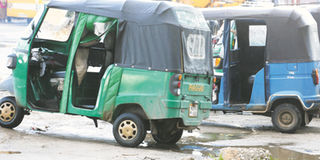Prime
Latra introduces new ‘daladala’ routes to curb unregulated rickshaw use

What you need to know:
- The initiative, which requires a total of 120 minibuses, is expected to ease congestion and offer reliable public transport alternatives in areas where many commuters currently rely on three-wheelers (Bajajis).
Dar es Salaam. In a move aimed at streamlining urban transport and curbing the unregulated use of three-wheelers, the Land Transport Regulatory Authority (Latra) has introduced six new ‘daladala’ routes and invited operators to apply for licences to run commuter buses on them.
The initiative, which requires a total of 120 minibuses, is expected to ease congestion and offer reliable public transport alternatives in areas where many commuters currently rely on three-wheelers (Bajajis).
According to Latra’s statement, the newly designated routes are Kigamboni Ferry to Kibada via Tungi Mjimwema road, Fremu Kumi to Kilungule via Mwangati road and Kigamboni Wilayani to Kilungule Station via Toangoma-Kongowe Road. Others are Tabata Chang’ombe to Kilungule Station via Vingunguti-Buza Road, Kigogo Sokoni to Kilungule Station via Chanika and Chamazi road and Tegeta Nyuki to Nyakasangwe via Bwawani Road.
Latra’s head of Communications and Public Relations Salum Pazzy said the goal is to bring structured and affordable transport services closer to the public.
“We encourage commuters to support the government’s efforts by using officially registered daladala services. Many are still depending on Bajajis, which are neither affordable nor accessible for all,” said Mr Pazzy.
He clarified that three-wheelers are not licenced to operate as public transport vehicles (daladalas) and are only permitted to offer ride-hailing or hire services from designated stands.
“Some of the routes we had previously gazetted remain inactive because operators have not applied for licences. In these areas, Bajajis have continued to operate informally,” he noted.
Mr Pazzy explained that feasibility studies conducted on the new routes revealed significant demand for formal commuter bus services.
Operators intending to apply for licences must have brand-new vehicles—each with a seating capacity of 15 to 20 passengers—that have never been registered in the licensing system. Drivers must also be vetted and approved by Latra.
“We are prioritising safety, affordability, and reliability, and we believe this intervention will help restore order in the city’s transport system,” said Mr Pazzy.

